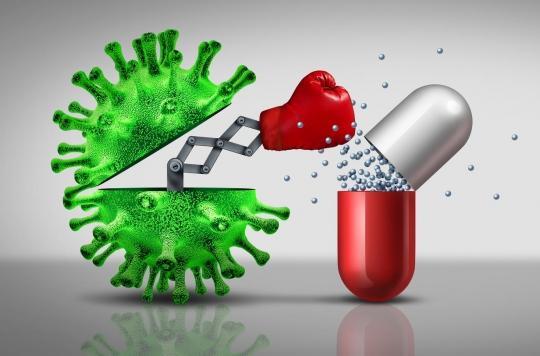A major health issue for decades to come, the fight against bacteria that are resistant to antibiotics may have just taken a step forward. Ingredients capable of targeting an enzyme through which it would be possible to render these bacteria harmless have shown their effectiveness in the laboratory.

They may not be prescribed as drugs for ten years, but the compounds developed by researchers from the Martin Luther University of Halle-Wittenberg already seem to be an effective response in the fight against antibiotic-resistant bacteria.
The particularity of active ingredients against resistant bacteria is that they target a special enzyme which only appears in bacteria in this specific form and which was previously not the target of other antibiotics. An enzyme which, having never yet developed resistance, would thus be the Achilles’ heel of these bacteria.
“To be able to treat infectious diseases reliably and in the long term, we need new active ingredients against which bacteria have not yet developed resistance”, reminds Professor Andreas Hilgeroth of the Institute of Pharmacy of the University Martin Luther from Halle Wittenberg who has worked with other teams of researchers on these new active substances, work published in the journal Antibiotics.
An enzyme involved in the metabolic process of bacteria
The target of these scientists: pyruvate kinase, an enzyme that plays an important role in the metabolic process of bacteria. And if this process is disrupted, the bacteria becomes harmless.
In the first experiments carried out on cells, the effectiveness of these new substances was confirmed and the compounds developed obtained at least the same results as conventional antibiotics. “These first results give us confidence that we are on the right track,” said Andreas Hilgeroth.
25,000 deaths per year
The fight against resistant bacteria is an issue for patients and healthcare managers around the world. It is estimated that it could be the cause of several million deaths by 2050. In Europe, the European Center for Disease Control estimates that 25,000 deaths per year are linked to antibiotic resistance. In France, despite a National Plan to preserve the effectiveness of antibiotics, the consumption of antibiotics remains abnormally high, which increases the risk of development of bacteria resistant to these drugs.
The most worrying of these multi-resistant bacteria are enterobacteria such as Escherichia coli and Klebsiella pneumoniae, bacteria of the digestive tract responsible for a very large number of infections, or methicillin-resistant staphylococci aureus, multi-resistant tubercle bacilli, as well as as bacillus pyocyanin and Acinetobacter baumanii which are bacteria infecting the lungs of people with cystic fibrosis and which are responsible for nosocomial infections (acquired in health care settings, in particular hospitals and clinics).
.

















